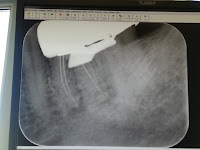Dimensions

Dimensions One of my aquarium fish passed away the other night, that after a rather lengthy battle of being upside down (swim bladder infection, something that usually comes on unexpectedly and almost always without explanation). It was and is terrible to watch something once so strong and once so vibrant just struggle to come back, and as with any living being, a difficult decision for the observer, whether viewing from behind a glass tank or behind a glass window in a hospital. It (the passage of life, no matter the difficulty) is something that all beings need to go through, said Elizabeth Kubler-Ross, although when you are there watching, you find those words difficult to embrace as true. End the suffering, you think...take the dog to the vet and have her put down, that old quality of life vs. quantity of life debate. But a fish, you wonder? Ours was over 12 years old, as are most of the other fish in our 55-gallon tank, trapped as prisoners but safe in a sense...fed, the

